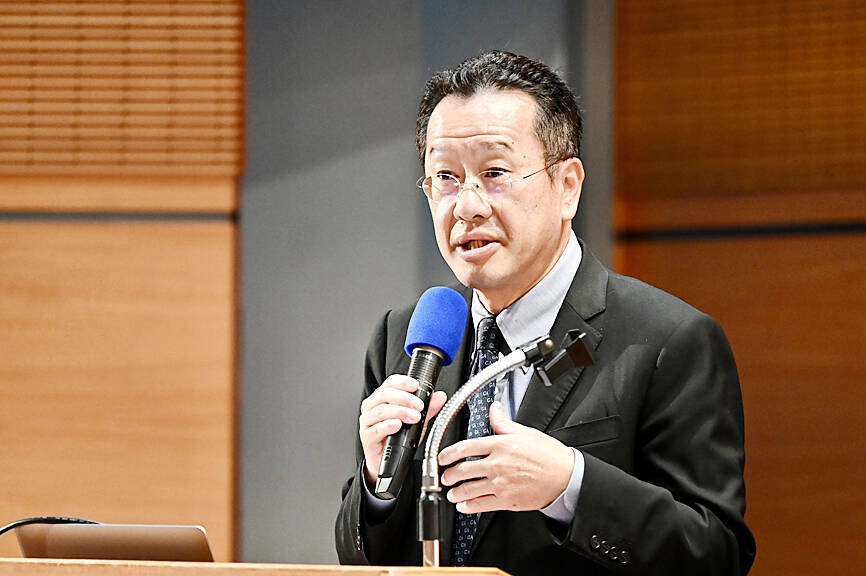Chinese President Xi Jinping (習近平) is unlikely to have the capability to successfully invade Taiwan by 2027, National Security Council (NSC) Secretary-General Wellington Koo (顧立雄) said yesterday, casting doubt on the progress of Beijing’s military modernization plans.
Taiwan would continue to delay the People’s Liberation Army’s (PLA) invasion timetable by strengthening its defense capabilities, Koo said.
“I don’t think it will happen in the near future or at least within one to two years,” Koo said of a Chinese invasion.

Photo: George Tsorng, Taipei Times
“If China needs to carry out amphibious landing operations to take Taiwan, I don’t think it will have such capabilities by 2027,” he said.
Koo declined to pinpoint when an attack could happen, saying only that Taiwan does not see Beijing making invasion preparations.
Beijing is already facing uncertainty next year from its own economic downturn, while the world must also deal with the US election, and wars in Europe and the Middle East, he said.
Xi is seeking to build a “world-class force” by 2027, a deadline that coincides with the 100th anniversary of the PLA.
Then-chairman of the US Joint Chiefs of Staff Mark Milley last year said that Beijing’s military would not be ready to invade Taiwan for “some time.”
Chairman of the US Joint Chiefs of Staff Charles Brown Jr last week said he doubts Beijing plans to take Taiwan militarily.
Koo said Taiwan would use mobile weapons such as anti-ship missiles, HIMARS, drones and Javelin anti-tank systems to make China’s landing operations more difficult in the event of an invasion.
The US plans to accelerate a HIMARS shipment by one year to 2026.
Earlier this month, Koo said the US government is taking steps to speed up the delivery of US weapons systems to Taiwan that have been delayed by factors including shipments to Ukraine.

POSITIVE DEVELOPMENT: Japan and the US are expected to hold in-depth discussions on Taiwan-related issues during the meeting next month, Japanese sources said The holding of a Japan-US leaders’ meeting ahead of US President Donald Trump’s visit to China is positive news for Taiwan, former Japan-Taiwan Exchange Association representative Hiroyasu Izumi said yesterday. After the Liberal Democratic Party’s landslide victory in Japan’s House of Representatives election, Japanese Prime Minister Sanae Takaichi is scheduled to visit the US next month, where she is to meet with Trump ahead of the US president’s planned visit to China from March 31 to April 2 for a meeting with Chinese President Xi Jinping (習近平). Japan and the US are expected to hold in-depth discussions on Taiwan-related issues during the

‘LIKE-MINDED PARTNER’: Tako van Popta said it would be inappropriate to delay signing the deal with Taiwan because of China, adding he would promote the issue Canadian senators have stressed Taiwan’s importance for international trade and expressed enthusiasm for ensuring the Taiwan-Canada trade cooperation framework agreement is implemented this year. Representative to Canada Harry Tseng (曾厚仁) in an interview with the Central News Agency (CNA) said he was increasingly uneasy about Ottawa’s delays in signing the agreement, especially as Ottawa has warmed toward Beijing. There are “no negotiations left. Not only [is it] initialed, we have three versions of the text ready: English, French and Mandarin,” Tseng said. “That tells you how close we are to the final signature.” Tseng said that he hoped Canadian Prime Minister Mark Carney

President William Lai (賴清德) yesterday bestowed one of Taiwan’s highest honors on Saint Vincent and the Grenadines (SVG) Ambassador Andrea Clare Bowman in recognition of her contributions to bilateral ties. “By conferring the Order of Brilliant Star with Grand Cordon on Ambassador Bowman today, I want to sincerely thank her, on behalf of the Taiwanese people, for her outstanding contribution to deepening diplomatic ties between Taiwan and SVG,” Lai said at a ceremony held at the Presidential Office in Taipei. He noted that Bowman became SVG’s first ambassador to Taiwan in 2019 and

A man walks past elementary school artworks at the Taipei Lantern Festival in Ximen District yesterday, the first day of the event. The festival is to run from 5pm to 10pm through March 15.